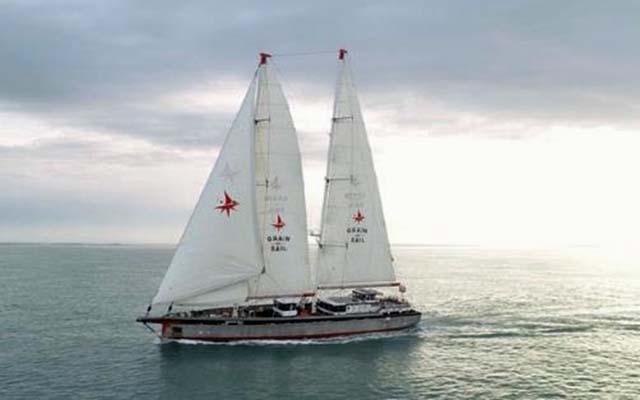The innovative ‘Grain de Sail II’ cargo sail ship has set sail across the Atlantic with a ballast water treatment system (BWTS) supplied by the French Bio-UV Group.
The vessel, based in St. Malo, transports French products to New York by sail before heading south to the Caribbean and loading locally grown organic products, such as cocoa and coffee beans.
The 52m wind-powered Grain de Sail II, named in January 2024 and built by French-headquartered shipbuilder Piriou Group – a long standing partner of the ballast water treatment system manufacturer – features a UV-based skid-mounted Bio-Sea L unit, installed with a Filtrex filter system. The system is designed to treat ballast water flow rates of 30m3/h.
Bio-UV Group CEO Laurent-Emmanuel Migeon said: “The successful delivery of Grain De Sail II, an aluminium-hulled schooner, marks a decisive step in the development of sustainable navigation. Bio-UV Group is committed to working with shipowners and shipyards that are pushing the boundaries of innovation and design to build a new generation of ships that respect the marine ecosystem.”
Wind-powered cargo ship applications particularly suit the compact Bio-Sea L series due to their low flow rate ballasting requirements, ranging from 13 to 120m3/h. System components are delivered all-inclusive and can be supplied in various configurations, such as modular, split skid or full skid versions, allowing maximum adaptability for onboard system integration.
Loïc Briand, MD Grain de Sail Shipping, said: “The successful build and delivery of this hugely innovative sustainable ship shows we are at the forefront of innovation in the rise of sustainable shipping across the maritime industry. By shipping goods across the Atlantic by cargo sailboat we have one of the lowest carbon footprints possible.”
Maxime Dedeurwaerder, Bio-Sea Maritime Business Unit Director, added: “Newbuild projects such as these are a great opportunity for Bio-UV Group to help reduce the environmental impact even further by preventing the migration of invasive species in the most effective way possible.”
Bio-Sea low flow rate ballast water treatment systems combine mechanical filtration and ultraviolet (UV) disinfection without any chemical treatment. The ‘L’ range of Bio-Sea BWTS is specially designed to meet the ballasting needs of vessels with small pump capacities. All components, including the power supply, are integrated into the system, removing the need for a separate power cabinet, saving space. In October 2023, Bio-UV Group unveiled its smallest low-flow Bio-Sea BWTS yet. The new Bio-Sea L Mini is designed for ballast water processing capacities below 30m3/h.
Image: ‘Grain de Sail 2’ cargo sail ship (credit: Loys Leclercq L20Naval)



